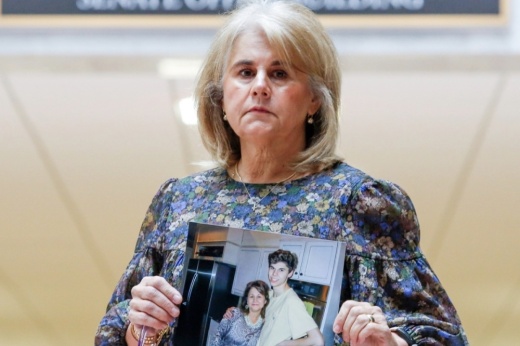San Antonio nonprofit David's Legacy Foundation is joining the nationwide fight to push for legislation that would hold social media platforms accountable for preventing and mitigating dangers to minors, including the promotion of suicide, eating disorders, substance use and sexual exploitation as well as advertisements for certain illegal products.
The Kid’s Online Safety Act, sponsored by U.S. Sens. Richard Blumenthal, D-Connecticut, and Marsha Blackburn, R-Tennessee, would require social media platforms to provide minors with options to protect their information, disable addictive product features and opt out of personalized algorithmic recommendations.
The bill, introduced in 2021, also would give parents new controls to spot harmful behaviors and provide them as well as schools with a dedicated channel to report any harm to minors, according to a Kid’s Online Safety Act brief.
The backstory
David’s Legacy Foundation and co-founder Maurine Molak have been promoting KOSA at the federal level since 2022. It has been more than six years since Maurine and her husband Matt Molak’s son, David Molak, died of suicide. The Molak family and David’s friends have said the Alamo Heights High School student’s death can be traced to his experiencing bullying in person and online.
On Sept. 1, 2017, David’s Law, which requires school districts to include cyberbullying in their district bullying policies, became effective in Texas. The law also requires a school district to notify a child's parents if they are a victim or alleged aggressor of bullying.
The Molaks and their foundation have since worked toward social media reform with a goal of implementing similar precautions at the federal level.
“We can't do it alone. We need safety by default at the highest setting for our children,” Maurine Molak said. “We need the social media companies to prevent and mitigate, as best as they can, the exposure of harmful and dangerous content that our kids could use to harm themselves.”
Maurine said congressional action on bullying and cyberbullying is needed, especially with school systems and health care experts pointing to a rise in mental health care challenges among children and teenagers.
“This is definitely something that we know as parents who have experienced it, and parents who have worked in this space together, to know what the damaging effect of it is,” Maurine Molak said.
Next steps
KOSA, also known as Senate Bill 1409, passed out of U.S. Senate Commerce Committee on July 27 with a unanimous vote. The next step is getting it on the Senate floor for a full Senate vote; once that happens, it would go over to the U.S. House of Representatives for a vote.
David’s Legacy Foundation along with many parents across Texas has been persistent about pushing this KOSA and will not stop until something is done, Maurine Molak said.
“I’ve been sharing my story, having Zoom meetings with senatorial offices, and garnering support from parents in Texas to call our U.S. Senators [Ted] Cruz and [John] Cornyn, and say that we need the social media companies to provide safeguards and privacy rails for our kids,” she added.
Diving in deeper
During the COVID-19 pandemic, Maurine Molak said she began to see the effects social media was having on younger individuals. She said trickle-down effects of the pandemic caused children and teenagers to be seriously attached to social media.
“We saw what the technology was doing to our kids when they were on their devices 24/7 without the prevention tools to help keep them safe,” she said. “With more research coming out, we saw this huge decline in mental health, and I knew that the conversation was right for me to be involved and share my story, especially with what we had accomplished in Texas at the federal level."
Research conducted by Screen and Reveal showed 59% of all U.S. teenagers have experienced some sort of cyberbullying, while more than 40% of teenagers said they would behave differently online if their parents were watching.
With this research in mind, Maurine Molak asked social media platforms as well as the government to help keep teenagers and children safe in any way they can.
“We are not saying that the government needs to parent our children nor that the social media companies need to be 100% responsible for our children. What we're saying is we want the social media companies to really be responsible in coming alongside parents by providing us with the tools we need to keep our kids safe online,” she said. “They employ some of the smartest people in the world, so we're asking them to use that technology and that knowledge to help the future generations.”




